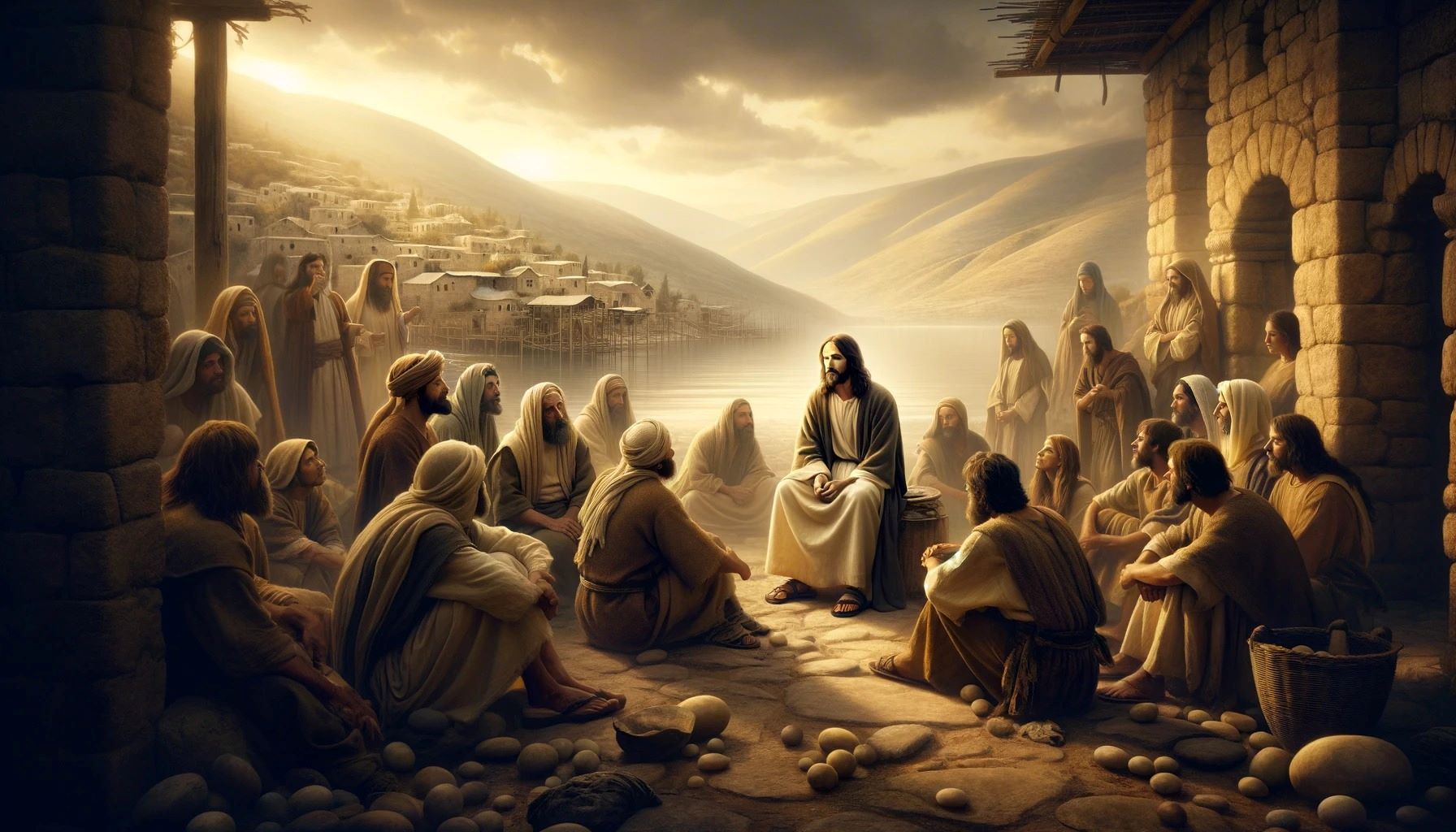Home>Christian Videos>Bible Stories>How Long Was The Ministry Of Jesus Christ


Bible Stories
How Long Was The Ministry Of Jesus Christ
Published: February 29, 2024
Jason DeRose, Managing Editor at Christian.net, uses his expertise in religion and journalism to deepen understanding of faith's societal impacts. His editorial leadership, coupled with a strong academic background, enriches the platform’s diverse content, earning him recognition in both journalism and religious circles.
Discover the duration of Jesus Christ's ministry and its significance in the Bible. Explore the timeline and impact of this pivotal period in biblical history. Gain insights into the length of Jesus' ministry and its profound influence on Christian teachings.
(Many of the links in this article redirect to a specific reviewed product. Your purchase of these products through affiliate links helps to generate commission for Christian.net, at no extra cost. Learn more)
Table of Contents
The Early Years of Jesus
The early years of Jesus Christ are shrouded in mystery and wonder. According to the New Testament, Jesus was born in Bethlehem to the Virgin Mary and her husband Joseph. His birth, heralded by angels and marked by the appearance of a bright star, is celebrated by Christians around the world on Christmas Day. Little is known about Jesus' childhood, but it is believed that he grew up in Nazareth, where he honed his carpentry skills under the guidance of his earthly father, Joseph. Despite the lack of detailed information about his early years, it is clear that Jesus' upbringing played a crucial role in shaping the extraordinary ministry that would later unfold.
-
The Virgin Birth: The story of Jesus' birth is one of the most cherished and debated aspects of Christian theology. According to the Gospels of Matthew and Luke, Mary, a young virgin, was visited by the angel Gabriel, who informed her that she would conceive a child by the power of the Holy Spirit. This miraculous conception, known as the Virgin Birth, is a cornerstone of Christian belief and is seen as a fulfillment of Old Testament prophecies.
-
The Flight to Egypt: Following the birth of Jesus, the Holy Family fled to Egypt to escape the wrath of King Herod, who sought to kill the infant Jesus. This event, known as the Flight to Egypt, is a poignant reminder of the hardships faced by the early followers of Jesus and the divine protection that shielded the young child from harm.
-
The Boy Jesus in the Temple: One of the few glimpses into Jesus' early years is found in the Gospel of Luke, where it is recounted that at the age of twelve, Jesus astounded the religious teachers in the temple with his wisdom and understanding. This episode foreshadowed the profound teachings and spiritual insight that Jesus would later impart to the world.
The early years of Jesus Christ set the stage for the remarkable ministry that would unfold in later years. His humble beginnings, marked by the miraculous circumstances of his birth and the quiet upbringing in Nazareth, serve as a testament to the extraordinary nature of his life and mission.
The Start of Jesus' Ministry
The start of Jesus' ministry marked a pivotal moment in the history of Christianity and the world. At the age of around thirty, Jesus began his public ministry by seeking baptism from John the Baptist in the Jordan River. This act symbolized the initiation of his divine mission and the affirmation of his role as the Son of God. Following his baptism, Jesus retreated into the wilderness, where he underwent a period of fasting and spiritual testing, preparing himself for the arduous yet transformative journey that lay ahead.
The Calling of the Disciples
One of the defining aspects of the start of Jesus' ministry was the calling of his disciples. Jesus selected twelve men from diverse backgrounds, including fishermen, a tax collector, and a zealot, to accompany him in his ministry. This diverse group of individuals would become the foundation of the early Christian church and play a crucial role in spreading the teachings of Jesus to the world.
The Sermon on the Mount
A significant event during the commencement of Jesus' ministry was the delivery of the Sermon on the Mount. This powerful and timeless sermon, which includes the Beatitudes and teachings on love, forgiveness, and righteousness, encapsulates the core principles of Jesus' message. The Sermon on the Mount continues to inspire and guide Christians in their faith and conduct to this day.
The Miracles and Healings
As Jesus began his ministry, he performed numerous miracles and healings, demonstrating his divine authority and compassion. From turning water into wine at the wedding in Cana to healing the sick and raising the dead, these miraculous acts served as tangible manifestations of God's power and love, drawing multitudes to witness the extraordinary works of the Son of God.
Read more: How Was Jesus Christ Conceived
The Opposition and Rejection
Despite the profound impact of his teachings and miracles, Jesus encountered opposition and rejection from various quarters, including religious leaders and skeptics. This resistance foreshadowed the challenges and ultimately, the sacrifice that Jesus would face as his ministry unfolded.
The start of Jesus' ministry marked the beginning of a transformative period in human history, characterized by profound teachings, miraculous deeds, and the establishment of a community of believers. This pivotal phase set the stage for the profound impact that Jesus' ministry would have on the world and the enduring legacy of his message of love, redemption, and salvation.
The Teachings and Miracles of Jesus
The teachings and miracles of Jesus form the heart of his ministry, encapsulating the profound wisdom and divine power that characterized his earthly mission. Through his parables, sermons, and miraculous deeds, Jesus conveyed timeless truths and demonstrated the tangible manifestation of God's kingdom on earth.
The Parables
Jesus often used parables, or simple stories with profound spiritual lessons, to convey deep truths about God's kingdom and the nature of humanity. The Parable of the Good Samaritan, the Parable of the Prodigal Son, and the Parable of the Sower are just a few examples of the impactful stories that continue to resonate with believers and non-believers alike. These parables challenged societal norms, revealed the nature of God's love and mercy, and called for a transformation of hearts and minds.
The Sermons
Jesus' sermons, including the Sermon on the Mount, the Sermon on the Plain, and the Olivet Discourse, provided comprehensive teachings on topics such as love, forgiveness, prayer, and the coming of God's kingdom. The Beatitudes, a central part of the Sermon on the Mount, outlined the characteristics and blessings of those who embody the values of God's kingdom, offering a radical and transformative vision of true happiness and fulfillment.
Read more: How Tall Was Jesus Christ
The Miracles
The miracles of Jesus, ranging from healing the sick to calming the storm, demonstrated his divine authority over nature, sickness, and death. These miraculous acts served as signs of God's kingdom breaking into the present world, offering hope, restoration, and liberation to those in need. The raising of Lazarus from the dead, the feeding of the five thousand, and the healing of the blind and the lame are just a few examples of the extraordinary miracles that affirmed Jesus' identity as the Son of God.
The Kingdom of God
Central to Jesus' teachings and miracles was the proclamation of the kingdom of God. Through his words and deeds, Jesus revealed the nearness of God's reign, inviting people to repent, believe in the good news, and participate in the unfolding of God's redemptive plan. The kingdom of God, characterized by justice, mercy, and love, stood in stark contrast to the prevailing systems of power and oppression, offering a vision of hope and transformation for all humanity.
The Impact
The teachings and miracles of Jesus left an indelible mark on his followers and the world at large. His profound insights into the nature of God, the human condition, and the kingdom of God continue to inspire and challenge individuals across cultures and generations. The miracles performed by Jesus not only brought immediate relief to those in need but also pointed to the ultimate victory over sin and death through his sacrificial death and resurrection.
The teachings and miracles of Jesus stand as a testament to his unique role as the Son of God and the embodiment of divine truth and love. They continue to beckon humanity to embrace the transformative message of the gospel and to participate in the ongoing work of God's kingdom in the world.
The Crucifixion and Resurrection
The crucifixion and resurrection of Jesus Christ represent the pinnacle of his earthly ministry and the central events of Christian faith. The crucifixion, which took place at Golgotha, also known as Calvary, was a harrowing and yet redemptive moment in human history. Jesus, unjustly condemned and subjected to unimaginable suffering, willingly endured the agony of the cross, bearing the weight of humanity's sin and brokenness. His sacrificial death fulfilled the prophetic promises of the Old Testament and provided the ultimate atonement for the sins of humanity.
The resurrection of Jesus, occurring three days after his crucifixion, stands as the cornerstone of Christian belief and hope. The empty tomb and the appearances of the risen Christ to his disciples and followers affirmed the reality of his victory over death and the grave. The resurrection validated Jesus' identity as the Son of God and the fulfillment of his promises to conquer sin and offer the gift of eternal life to all who believe in him.
The crucifixion and resurrection of Jesus Christ hold profound significance for believers. They represent the ultimate expression of God's love and grace, as well as the assurance of forgiveness, redemption, and the hope of new life. The crucifixion reveals the depth of God's solidarity with humanity in suffering, while the resurrection proclaims the triumph of life over death and the inauguration of God's kingdom on earth.
The events of the crucifixion and resurrection serve as a powerful reminder of the transformative power of faith and the enduring impact of Jesus' ministry. They invite individuals to embrace the message of salvation and to participate in the new life made possible through the death and resurrection of Jesus Christ. The crucifixion and resurrection stand as a testament to the profound love and redemptive purpose of God, offering hope and reconciliation to all who turn to Christ in faith.
Read more: How To See Jesus Christ
The Impact of Jesus' Ministry
The impact of Jesus' ministry reverberates through the annals of history and continues to shape the lives of countless individuals across the globe. His teachings, miracles, and ultimate sacrifice have left an indelible mark on humanity, transcending time and cultural boundaries. The profound impact of Jesus' ministry can be observed in various aspects, encompassing spiritual, social, and ethical dimensions.
Spiritual Transformation
Jesus' ministry brought about a profound spiritual transformation in the lives of his followers. His message of love, forgiveness, and redemption offered a radical departure from the legalistic and ritualistic practices of the time, inviting individuals to experience a personal relationship with God. The transformative power of Jesus' ministry continues to draw people to faith, providing a source of hope, comfort, and purpose in the midst of life's challenges.
Social Justice and Compassion
Central to Jesus' ministry was a call for social justice and compassion. His interactions with the marginalized, the outcasts, and the oppressed demonstrated a radical inclusivity and a challenge to societal norms. The ministry of Jesus inspired a legacy of compassion and care for the vulnerable, influencing movements for social reform, humanitarian aid, and the pursuit of justice for the marginalized.
Ethical and Moral Influence
The ethical teachings of Jesus, encapsulated in the Sermon on the Mount and his parables, continue to serve as a moral compass for individuals and societies. The principles of love for one's neighbor, forgiveness, humility, and peacemaking have permeated ethical frameworks and guided countless individuals in their conduct and relationships. The ethical impact of Jesus' ministry extends to areas of governance, human rights, and the pursuit of a more just and equitable world.
Read more: How To Live In Jesus Christ
Cultural and Artistic Expression
The impact of Jesus' ministry is also evident in the realm of culture and artistic expression. His life, teachings, and the events of his ministry have inspired some of the world's most enduring works of art, literature, music, and film. The enduring influence of Jesus' ministry on cultural and artistic endeavors reflects the depth of his impact on human creativity and expression.
Global Spread of Christianity
Perhaps the most far-reaching impact of Jesus' ministry is the global spread of Christianity. From its humble beginnings in the first century, Christianity has grown to become the world's largest religion, with followers spanning diverse cultures, languages, and geographic regions. The ministry of Jesus laid the foundation for a faith that continues to shape the beliefs, values, and practices of billions of people worldwide.
The impact of Jesus' ministry transcends the confines of history and theology, permeating the fabric of human existence and offering a vision of hope, transformation, and redemption. His ministry continues to inspire, challenge, and beckon individuals to embrace the profound message of God's love and the enduring legacy of Jesus Christ.











